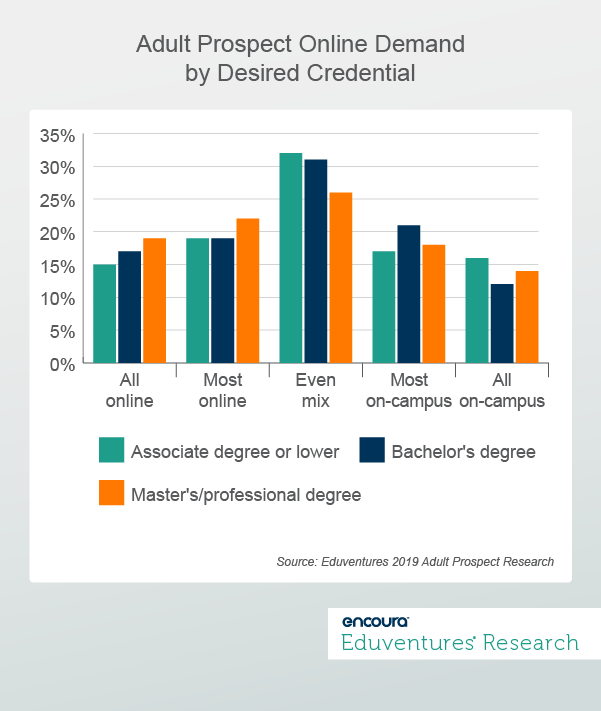With few exceptions, U.S. postsecondary institutions have responded to the COVID-19 pandemic quickly and decisively. Schools have focused on remote learning logistics, campus evacuations, and virtual commencements. The traditional first-time full-time student, resident on campus, has been particularly impacted. But what about adult learners?
The economic fallout of COVID-19 is unprecedented. In one month, more than 22 million people filed for unemployment, nearly exceeding all claims since February 2017. Are schools equipped to respond to the increased adult demand for degrees that has historically followed an economic collapse? Or will adults flock to providers touting cheaper and faster credentials?
Higher education’s nervous relationship with economic trends is a familiar story: enrollments have historically tipped upward during recessions, driven by adults seeking to reskill in the wake of layoffs. The rapidity and global scale of the COVID-19 pandemic demands a fresh look at how schools should best serve working adults. The counter-cyclical enrollment playbook could be due for a rewrite.
This time around, the economic consequences of COVID-19 risk gutting state higher education budgets, many of which never rebounded to pre-Great Recession levels. As part of Eduventures’ ongoing analysis of adult learner educational preferences, here are three critical questions we are tracking:
1. Is this the dawn of the non-degree credential?
This will depend, in part, on whether employers will pivot toward skills-driven hiring, and away from a blanket reliance on degrees as a way of sifting first-round candidates. While this may be plausible in information technology and some business fields, licensure requirements in other disciplines could complicate this shift.It also remains to be seen how a post-COVID-19 economy will impact adult learner attitudes toward degrees. The Eduventures 2019 Adult Prospect Research™ suggests that, pre-pandemic, adults were twice as likely to pursue a degree as a certificate, depending on prior educational experiences and enrollment intensity. While growing adult learner interest in non-degree credentials was evident pre-COVID-19, it was still far adrift from interest in degrees. Indeed, adults without a degree expressed much less interest in degree alternatives than those who already had a degree, undermining the case that degree alternatives should appeal to those with the least postsecondary capital.
But if this economic downturn is deep enough, it could cause adults to turn toward lower-cost options. And if MOOC enrollment is a fair barometer, Coursera’s notable spike could be an early indicator. By the end of March, Coursera reported a 370% increase across all courses and subjects from March 2019. While it’s not possible to discern the proportion of working adult enrollees as opposed to traditional students enrolled in a Coursera course that their school used as part of remote instruction, it’s a significant bump and something to keep an eye on.
2. Is the online learning demand curve beginning to bend?
COVID-19 has forced remote learning on schools and students, and it’s clear that, for the most part, these emergency arrangements are a long way from true online learning. Many adult learners have already studied online, but many have not, or only in part.
Eduventures 2019 Adult Prospect Research revealed rather tepid enthusiasm for wholly online courses compared to blended options: more than 80% of adult prospects preferred something other than wholly online (Figure 1).

It is also true that adult prospect preference for wholly online study has not grown much over the past decade, although it is certainly true that many more adults have opted for the delivery mode in practice. New data, however, suggests a growing openness to online learning, if only by default. Strada Education NetworkSM, a national research and philanthropic nonprofit, is conducting weekly national surveys assessing the impact of COVID-19. The most recent survey found that about a third of adult learner respondents expect to seek more education in response to the pandemic.
Among these adults who anticipate some kind of enrollment, 54% report that they would opt for “an online community college, online university, or online education provider.” In contrast, only 25% of these adults indicated they would prefer a face-to-face community college or university. Again, when most college campuses are closed and the pandemic may linger for months, it is not surprising that online options are top of the list right now, but a mix of anxiety and necessity will expose many more adults to learning online. Adults thrust into longstanding, quality online programs may do much more for online momentum than 18-year-olds navigating hasty remote instruction.
That said, a further test of online learning will be how to effectively virtualize hands-on labs, clinics, studios, and similar experience-based learning environments where up to now, online has been supplementary at best.
3. Which schools will meet the needs of post-COVID-19 adult learners?
Many schools that serve adult learners must delicately thread a rapidly shrinking needle: drastically trim budgets, still deliver relevant credentials, and cut tuition or boost aid to accommodate millions of adults struggling with loss of income and increased debt. According to a recent survey from the Association of American Colleges and Universities (AACU), more than 70% of school leaders anticipate revenue declines of between 10% and 25%. For most, this is clearly a “do more with less” moment.
Legislative and regulatory change at the federal level, currently being advocated for, would definitely benefit adult learners and the schools that serve them right now. In the meantime, the adult-focused school playbook looks familiar, just more acute:
- Support adult learners with maximum responsiveness and flexibility.
- Strive for greater affordability without compromising existing revenue from tuition and fees (although this is only feasible if schools leverage online learning to re-think instructional models to lower costs).
- (For most schools) Prioritize the local appeal and relevance of academic and vocational offerings to counter the pitch of the online giants.
- Ensure that transfer and credit-for-prior-learning policies are as free from bureaucracy as possible.
- Tightly align criteria for academic program expansion or contraction to local recovery programs and funding.
- Invest in credentialing programs that anticipate and respond to future public health crises.
It’s less coincidence than logic that adult-focused schools that achieved the greatest growth since the Great Recession embody many of these attributes.
The Bottom Line
The coming months will determine whether COVID-19 spawns a counter-cyclical adult enrollment boom--and it should be acknowledged that there are certainly plausible scenarios in which it might not. Now is not the time for schools to worry about letting “a good crisis go to waste.” Adult-focused schools need to double-down on what they have always done: ensure that their enrollment policies, academic programming, and support services are finely-tuned to what adult prospects want and employers need. A pandemic will severely test the adult learner status quo.
Eduventures Principal Analyst at ACT | NRCCUA
Contact
Thursday, April 23, 2020 at 2PM ET/1PM CT
The CHLOE project — a joint undertaking by Quality Matters and Eduventures — has been taking the pulse of higher education leaders on a national scale since its inception in 2016. While priority for higher ed institutions has now shifted to the safety of students, faculty, and staff amid the uncertainty that surrounds us, the continuity afforded by online learning is precious—however rudimentary arrangements may be on the ground.
Our thanks and admiration go out to the thousands of online leaders, staff, and online learning company employees going above and beyond to stand up remote classes in short order. That so many schools could even consider “going online” in an emergency is testament to how far online has come.
Join us on Thursday, April 23rd at 2pm ET/1pm CT as Eduventures Chief Research Officer Richard Garrett and Quality Matters Executive Director Emeritus Ronald Legon lead our next webinar to discuss the latest findings from the CHLOE 4 report.

